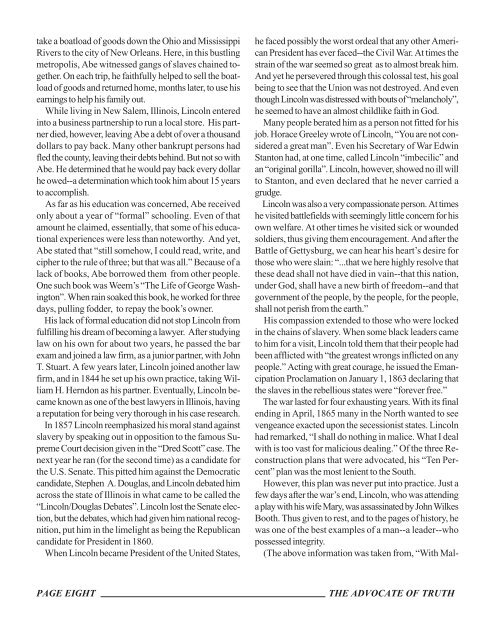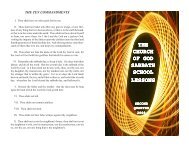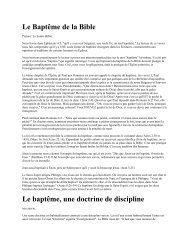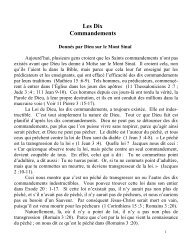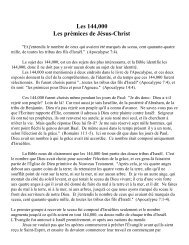The Advocate of Truth - Church of God (7th Day)
The Advocate of Truth - Church of God (7th Day)
The Advocate of Truth - Church of God (7th Day)
Create successful ePaper yourself
Turn your PDF publications into a flip-book with our unique Google optimized e-Paper software.
take a boatload <strong>of</strong> goods down the Ohio and Mississippi<br />
Rivers to the city <strong>of</strong> New Orleans. Here, in this bustling<br />
metropolis, Abe witnessed gangs <strong>of</strong> slaves chained together.<br />
On each trip, he faithfully helped to sell the boatload<br />
<strong>of</strong> goods and returned home, months later, to use his<br />
earnings to help his family out.<br />
While living in New Salem, Illinois, Lincoln entered<br />
into a business partnership to run a local store. His partner<br />
died, however, leaving Abe a debt <strong>of</strong> over a thousand<br />
dollars to pay back. Many other bankrupt persons had<br />
fled the county, leaving their debts behind. But not so with<br />
Abe. He determined that he would pay back every dollar<br />
he owed--a determination which took him about 15 years<br />
to accomplish.<br />
As far as his education was concerned, Abe received<br />
only about a year <strong>of</strong> “formal” schooling. Even <strong>of</strong> that<br />
amount he claimed, essentially, that some <strong>of</strong> his educational<br />
experiences were less than noteworthy. And yet,<br />
Abe stated that “still somehow, I could read, write, and<br />
cipher to the rule <strong>of</strong> three; but that was all.” Because <strong>of</strong> a<br />
lack <strong>of</strong> books, Abe borrowed them from other people.<br />
One such book was Weem’s “<strong>The</strong> Life <strong>of</strong> George Washington”.<br />
When rain soaked this book, he worked for three<br />
days, pulling fodder, to repay the book’s owner.<br />
His lack <strong>of</strong> formal education did not stop Lincoln from<br />
fulfilling his dream <strong>of</strong> becoming a lawyer. After studying<br />
law on his own for about two years, he passed the bar<br />
exam and joined a law firm, as a junior partner, with John<br />
T. Stuart. A few years later, Lincoln joined another law<br />
firm, and in 1844 he set up his own practice, taking William<br />
H. Herndon as his partner. Eventually, Lincoln became<br />
known as one <strong>of</strong> the best lawyers in Illinois, having<br />
a reputation for being very thorough in his case research.<br />
In 1857 Lincoln reemphasized his moral stand against<br />
slavery by speaking out in opposition to the famous Supreme<br />
Court decision given in the “Dred Scott” case. <strong>The</strong><br />
next year he ran (for the second time) as a candidate for<br />
the U.S. Senate. This pitted him against the Democratic<br />
candidate, Stephen A. Douglas, and Lincoln debated him<br />
across the state <strong>of</strong> Illinois in what came to be called the<br />
“Lincoln/Douglas Debates”. Lincoln lost the Senate election,<br />
but the debates, which had given him national recognition,<br />
put him in the limelight as being the Republican<br />
candidate for President in 1860.<br />
When Lincoln became President <strong>of</strong> the United States,<br />
he faced possibly the worst ordeal that any other American<br />
President has ever faced--the Civil War. At times the<br />
strain <strong>of</strong> the war seemed so great as to almost break him.<br />
And yet he persevered through this colossal test, his goal<br />
being to see that the Union was not destroyed. And even<br />
though Lincoln was distressed with bouts <strong>of</strong> “melancholy”,<br />
he seemed to have an almost childlike faith in <strong>God</strong>.<br />
Many people berated him as a person not fitted for his<br />
job. Horace Greeley wrote <strong>of</strong> Lincoln, “You are not considered<br />
a great man”. Even his Secretary <strong>of</strong> War Edwin<br />
Stanton had, at one time, called Lincoln “imbecilic” and<br />
an “original gorilla”. Lincoln, however, showed no ill will<br />
to Stanton, and even declared that he never carried a<br />
grudge.<br />
Lincoln was also a very compassionate person. At times<br />
he visited battlefields with seemingly little concern for his<br />
own welfare. At other times he visited sick or wounded<br />
soldiers, thus giving them encouragement. And after the<br />
Battle <strong>of</strong> Gettysburg, we can hear his heart’s desire for<br />
those who were slain: “...that we here highly resolve that<br />
these dead shall not have died in vain--that this nation,<br />
under <strong>God</strong>, shall have a new birth <strong>of</strong> freedom--and that<br />
government <strong>of</strong> the people, by the people, for the people,<br />
shall not perish from the earth.”<br />
His compassion extended to those who were locked<br />
in the chains <strong>of</strong> slavery. When some black leaders came<br />
to him for a visit, Lincoln told them that their people had<br />
been afflicted with “the greatest wrongs inflicted on any<br />
people.” Acting with great courage, he issued the Emancipation<br />
Proclamation on January 1, 1863 declaring that<br />
the slaves in the rebellious states were “forever free.”<br />
<strong>The</strong> war lasted for four exhausting years. With its final<br />
ending in April, 1865 many in the North wanted to see<br />
vengeance exacted upon the secessionist states. Lincoln<br />
had remarked, “I shall do nothing in malice. What I deal<br />
with is too vast for malicious dealing.” Of the three Reconstruction<br />
plans that were advocated, his “Ten Percent”<br />
plan was the most lenient to the South.<br />
However, this plan was never put into practice. Just a<br />
few days after the war’s end, Lincoln, who was attending<br />
a play with his wife Mary, was assassinated by John Wilkes<br />
Booth. Thus given to rest, and to the pages <strong>of</strong> history, he<br />
was one <strong>of</strong> the best examples <strong>of</strong> a man--a leader--who<br />
possessed integrity.<br />
(<strong>The</strong> above information was taken from, “With Mal-<br />
PAGE EIGHT<br />
THE ADVOCATE OF TRUTH


